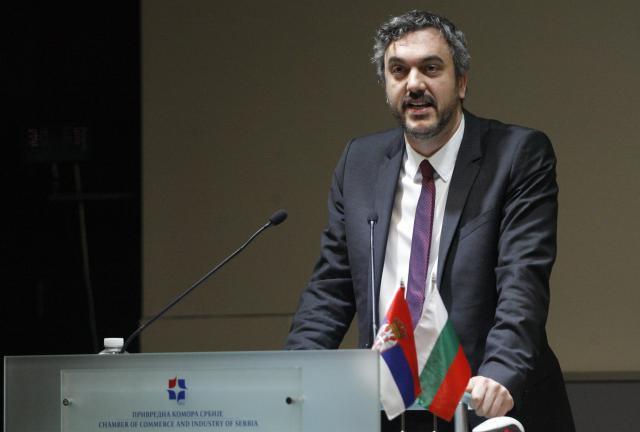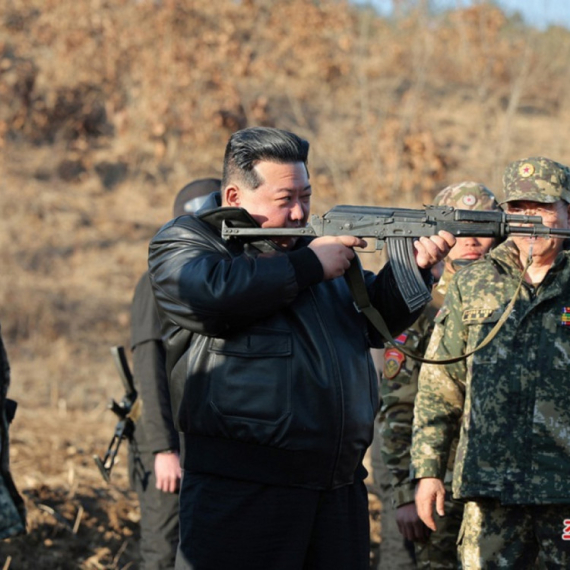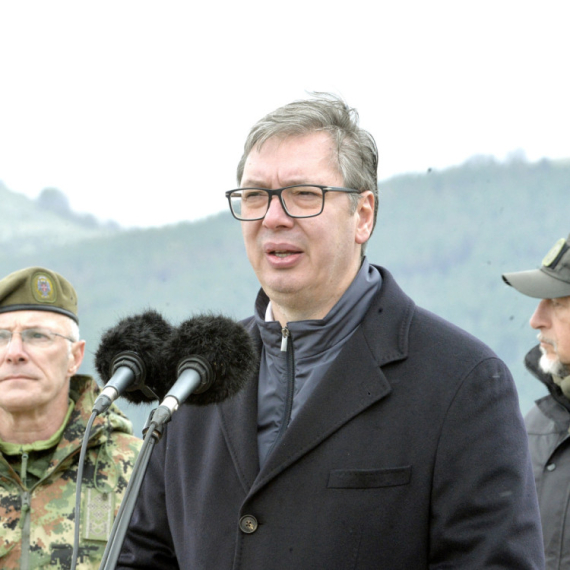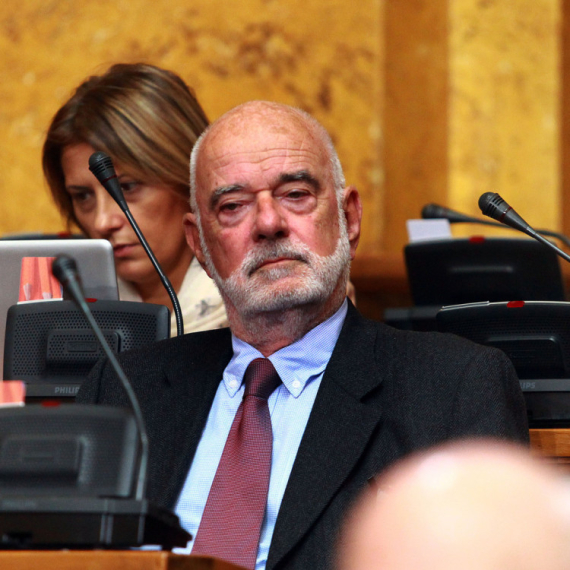"Region is in a crisis - but business always finds a way"
Friday, 09.09.2016.
10:43

"Region is in a crisis - but business always finds a way"
You have talked recently to colleagues from the region about the activities of chambers of commerce of the Western Balkan. It is not uncommon to hear that politics and economy don’t go hand in hand; so, in the light of numerous tumults in the region, what does strengthening economic relations entail and what does removing obstacles in the region mean?Marko Cadez: It is everywhere, not only in this region, that economy is more or less influenced by politics, the same way as economic trends affect political developments. Our companies have natural interest in cooperation, and business is like water – it always finds its way, an easier or harder one. Business is speedier that politics, business people find their common language and remove the barriers way easier than politicians. Business people resolve problems by finding spots of mutual interest, bringing to the fore what brings mutual benefit, profit and success. Principles and practices governing the business world can largely help processes of political normalization too.
Being representatives of business communities, the chambers of commerce of the region, assembled under the Chamber Investment Forum in the framework of the Berlin Process, make significant contributions to the efforts to normalize relations in the region. We constantly send messages to our politicians on the importance of preserving political stability, and we raise public awareness on the necessity and the importance of regional cooperation for economic progress in the region by performing concrete activities aimed at connecting business communities, by insisting on removing business barriers. None of the processes we strive for, including the European integration, will make any sense unless we all together, just like everyone individually, grow stronger, develop, become more competitive and attract more investments. Such progress is hard to achieve on one’s own. It is essential not to close one’s national frameworks, to cooperate with one’s neighbors, to change together the image of the region we have had for two decades, not to go back to the past but to build a future together – to go into the world together and approach investors and buyers. It is only with a good strategy, quality cooperation and strong business activities that we can boost the economy of the entire region. We find the experiences of the Nordic countries valuable, which had been at war in the past but are now cooperating closely at all levels, building their prosperity on pronounced work ethics, responsibility towards the state and the system they live in, as well as using the possibilities and potentials of regional cooperation.
We wish for the Balkan political area to settle down in the upcoming period, without striking sparks that didn’t fail to appear in the past, casting a shadow over regional cooperation. At the same time, I am strongly convinced that the stronger and better our economic ties are and the more our communities recognize the economic interests and benefits from the results of regional cooperation, the less intensive will the political tensions be.
What exactly is meant by such a connection and, concretely, what benefits will Serbia have from it?
M.C.: Each contact, each agreement and job concluded through the chambers’ regional initiatives and activities is a contribution to the development of our companies individually, our economies and the region as a whole. The benefits are best shown on examples.
Can there be a benefit more concrete that the fact that, for instance, last year in September, twenty food industry companies, members of the Chamber of Commerce of Serbia, took part at the Agricultural Fair in Priština, and each of them, in direct talks with Kosovo companies, reached agreements resulting in concrete jobs and increase in trade. This year, there is even more interest in this fair. Meanwhile, the two chambers have worked on the harmonization of customs procedures, phytosanitary and veterinary certificates, which serve to remove obstacles from trade between the two business communities. A more illustrative example is the company “Nevena” from Leskovac, which is going back to the Kosovo market after many years, following the recent meetings that we have organized with Kosovo retail chains. Two forums in Gračanica and Belgrade were attended by more than 200 companies, members of the Chambers of Commerce of Serbia and Kosovo from all sectors, and this speaks enough about the interest of business people to connect, not only through trade, but also through other forms of cooperation, through the implementation of common projects, establishment of consortia and clusters.
A few days ago, the chambers of the region signed the Digital Initiative in Slovenia and agreed on joint activities to boost the process of digitalization aimed at strengthening competitiveness of the economies and smoother mutual linking of companies. We expect companies of the entire region at the Belgrade Energy Fair in October. We will present together our economy to German companies in Munich at the Western Balkans Forum, organized by the Chambers of Commerce of Serbia and Bavaria, the same way our companies took part at the German buyers’ initiative for the Western Balkans countries in Dortmund.
The meaning of a joint approach in resolving the issues of companies in the region is best illustrated by the fact that within the initiative of the Chamber Investment Forum we obtained, through joint efforts, a five-year extension of autonomous trade measures – preferential trade regime for companies of the Western Balkans trading with the European Union.
In which way can companies jointly reach third markets and approach foreign investors?
M.C.: Individually, our companies have relatively modest potentials, resources and production to compete seriously with developed companies of the world market and to obtain jobs at regional and international tenders. However important this is for large companies, it is even more important for small and medium enterprises. Therefore, it is essential to put them together, to make them act together in the region and on third markets. For this reason, we have established the Chamber Investment Forum, we are working on connecting companies within the same industry; we put efforts to establish a construction consortium that could compete in tenders for major infrastructural projects to be implemented within the framework of the Berlin Process, financed by the European Union. We are connecting companies in energy, metal and arms industry… One of the projects is a joint tourism product of the region, particularly important for attracting tourists from remote destinations, who would not want to travel otherwise for so long just to sit on the slopes of the Kopaonik Mountain or at the sea coast. We want to make a selection of wine producers that will approach together buyers in remote markets.
Additionally, when politicians from the region visit some larger country, such as the USA, Russia or China, we envisage establishing a regional economic forum over there in which companies from our entire region would participate. It is also important to work on improving the business climate and improving the attractiveness of the region for new investments and for the creation of new jobs, to connect in the fields of infrastructure and business, to strengthen our capacities for larger production and export volumes and to approach the world and the investors as one region; because, when assessing the feasibility of investments in a particular destination, investors take into consideration the possibility of regional expansion as well. No investor will come just for one piece of the whole area and small scattered markets, but rather for 30 million consumers in the whole region.
We have witnessed a recent wheat problem which created tensions between Macedonia and Serbia; how can similar situations be prevented in the region?
M.C.: That problem is nothing new. It was solved last year thanks to a joint intervention of the Chambers of Commerce of Macedonia and Serbia within the scope of activities of the Chamber Investment Forum. This year it re-occurred and that was one of the topics during my visit to Macedonia. In order to prevent having the same talks about the same problem next year, and in accordance with a recently reached agreement between the responsible ministries and other public institutions, the Macedonian and Serbian Chambers of Commerce will put efforts to set the same fees for phytosanitary certification as soon as possible, to update the bilateral agreement on food safety and veterinary issues and to ensure mutual recognition of certificates, as a permanent solution.
Nevertheless, obstacles are imposed on Serbia not only by Macedonia. Free trade in the region is hampered by about hundred similar unilateral technical measures. Other countries as well are prone to non-tariff barriers. Faced with poor capacities of their economies and wishing to protect domestic markets and to close the door to competition for economic and sometimes even political reasons, they shortsightedly set limits on others, while setting limits to themselves as well, instead of allowing free flow of goods, labor and capital, encouraging mutual trade and cooperation and, thus, strengthening their companies and economies. At the Chamber Investment Forum, we are urging governments and relevant institutions to remove the existing obstacles and not to impose new ones, to give impetus to business instead of holding it back. We are working jointly to prepare records of all such obstacles and to draft a White Paper of recommendations for their removal and for improving the conditions for business operations and investments in the region.
Albanian Prime Minister Edi Rama said he would personally support the establishment of a Serbian-Albanian Chamber. Can you tell us how its work is conceived (whether it will be recognized) and in which areas the two countries could cooperate?
M.C.: The Serbian-Albanian Chamber is to be established with a view to bringing our business communities closer, to provide for efficient communication and cooperation of companies and to mobilize a large unused potential for the improvement of trade, investments and economic relations of the two countries. The establishment of a mixed chamber based in Tirana, which will be recognized by both countries as such, has been initiated by Albanian and Serbian business people and supported by the Chamber of Commerce of Serbia, Union of Chambers of Commerce and Industry of Albania, Chamber of Commerce of Tirana and other Albanian business associations. The launch of its operations will be formalized at the Serbia-Albania Forum, on October 14 in the City of Niš, on the occasion of the meeting between Prime Minister Aleksandar Vučić and Prime Minister Edi Rama.
There is a big open space for cooperation between the two business communities through trade, investments or common projects that we recognized in virtually all areas, particularly in agriculture and tourism, but also in the metallurgical, chemical, mechanical, metal, wood processing industries and civil engineering. There are significant possibilities of hiring our design and construction companies on regional and major projects that Albania is planning to implement in the upcoming period. If a highway from Niš via Priština to Durrës or a railway connecting the infrastructure of Western Balkan countries is to be constructed, that is the opportunity for creating a network of our companies to apply for tenders for these works jointly, organized in consortia.
This said, what role can the Chamber Investment Forum within the framework of the Berlin Process play in connecting companies of the region? What is the objective of the CIF, how many companies are taking part in it?
M.C.: The core of the Berlin Process and the initiative of German Chancellor Merkel is stability, prosperity and European path of the entire region: through stronger mutual linking, strengthening regional cooperation as the basis of stabilization and the European accession process and regional development by implementing concrete joint infrastructural and other development projects.
The Chamber Investment Forum, as a regional platform made up of eight national chambers with around 350,000 member companies (six chambers of Western Balkan countries and chambers of Croatia and Slovenia), has been established within the framework of the Berlin Process, at the initiative of the Chambers of Commerce of Serbia and Kosovo with the objective of connecting and including business communities of the region in the implementation of infrastructural and other regional development projects. As assessed by European high officials, one year after its foundation, the Chamber Investment Forum has grown to be the strongest cohesion factor in the region, connecting economies, removing obstacles to mutual successful business operations, implementing projects aimed at strengthening capacities of our business entities and their networking. We are working on building up a common e-platform for the exchange of information and data, as well as on the creation of a joint register of members and exploring possibilities of determining the solvency of all companies in the region. A special platform for small and medium enterprises will enable better networking, ease of access to sources of funding and providing joint services to the sector of SMEs. One of the projects is the establishment of a regional school for human resources development and, based on the initiative of Croatian colleagues, setting up a regional innovation center to connect companies, science and research institutions at one place.
You recently stated that regional chambers of commerce will be the first door to knock on for the economy in the future; the city of Leskovac was the first to access such a new system; what has that yielded? Can a similar system be applied in the region as well?
M.C.: Briefly, the new Law on Chambers of Commerce, compulsory membership and unique chamber system brings possibilities of larger impact on the creation of regulatory framework and overall business environment, essential decentralization and transfer of chamber services and public empowerment pertaining to Chamber of Commerce of Serbia to regional chambers. All services shall be standardized and have the same quality at the whole territory of Serbia, being provided in the same way, according to an identical procedure. Unlike so far, the unique chamber system will enable all public empowerments granted to Chamber of Commerce of Serbia by law (issuing import/expert documents, certificates, attestations) to be implemented at regional chambers of commerce, which is more rational and favorable from the point of view of business entities. The significance of this is supported by the fact that the Chamber of Commerce of Serbia issues more than 120,000 various documents annually, half of which goes to business entities from inside the country, who have to come directly to Belgrade to get them, which is a time consuming additional cost, putting extra burden on workforce. A business entity from Kragujevac, Leskovac, Užice or Subotica will be able to get the job done in their regional chamber or electronically, sitting in the office, because we are introducing e-services through the process of digitalization, setting off in September.
At the same time, no legal act governing economy can any longer be passed without prior opinion of the business sector, and regional chambers of commerce (their parliaments) will be the contact point, origin of standpoints, opinions, initiatives of business entities on economic policy measures and legal solutions.
Generally, the model of modernization of Serbian chamber system and novelties we are introducing are increasingly becoming a model for chambers of the region, interested in implementing the solutions taken over by Serbia in their chamber practices respectively.
The export of Serbian software surpassed the one in other industries. IT industry growth is superior to 25%, whilst the export of domestic software was € 580 million worth. What is Chamber of Commerce of Serbia doing in that sector, how interested is the domestic industry to find out more about that and which steps should be taken to make it part of global, developed economy?
M.C.: At this moment, Serbia has more than 2,200 IT companies employing almost 20,000 people. The contribution of this sector to Serbian foreign trade balance is growing year after year. Last year the export in ICT sector increased for a quarter compared to the year before – from € 542 million in 2014 to € 678 million, the major part being from ICT services – € 610 million. The export of computer services has grown since 2007 with a two-digit rate and nowadays their exchange with world is in surplus.
ICT service sector apparently represents Serbia’s great opportunity for export, achieving excellent performance thanks to “domestic intellect”. In order to increase this potential, use it and position in the world in the best possible way, it is necessary to design a set of stimulating measures and to strengthen this sector as the basis for further development of economy and society. We have also a big struggle ahead to keep our best IT experts bearing in mind very enticing offer of the European market. Additionally, considerable investment in education and continuous improvement and harmonization of the educational system with market needs is necessary for further development of ICT potential in the country.
Recently you have had meetings with almost all colleagues in the region. What are the impressions, how ready are they to cooperate?
M.C.: Readiness for cooperation is best confirmed in our continuous joint activities and almost day-to-day communication within the Chamber Investment Forum. However, our latest meetings have been especially important, because we have been given political support by President and Prime Minister for our activities. Europe gave us credit for what we are doing to foster regional cooperation and political managements acknowledge us: whether we are in Brussels or somewhere in the region, we have the doors open for meeting the highest officials. And most importantly, this is appreciated by our business entities since, month after month, they can feel increasing benefits from chamber cooperation and initiatives.
















































Komentari 1
Pogledaj komentare